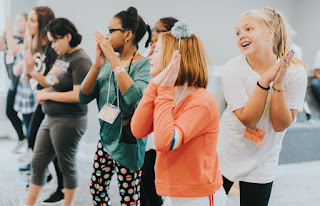Interview with Lauren Morris
What made you come up with the idea to have a dance studio for people with different abilities?
- Lauren Morris took first dance class at age 3 and first had the idea to start a dance studio at age 13. She was on the way home from dance class with her mom and they started talking about a girl who had Down syndrome. The girl was super happy and loved to dance. Lauren asked her mom why there was not a dance studio for individuals like that girl, but she did not realize she would be the person to create one.
- Lauren majored in dance education at the University of Southern Mississippi and she had to do a research project on dance and present it to staff and peers. The idea of creating a dance studio for people with disabilities resurfaced so she did the presentation on why there need to be studios like this (but did not think she would be able to create one because she did not have personal relationship with anyone with IDD).
- She interned at a nonprofit dance studio for a low income neighborhood and realized her idea was similar to this but for a different community. She reached out to the exec of this nonprofit and the exec explained how she needed to write grants and get the nonprofit to function.
- Lauren moved to Nashville and was able to explore this. She rented out a space and did a week-long summer dance camp for people with Down syndrome to test out the level of response that she would get.
- It was extremely successful and she realized she wanted to pursue this full time. Lauren networked, had a fundraiser, and then the next summer opened up the dance studio: MOVE Inclusive Dance.
What is a positive success story you would like to share?
- In her studio lobby, there is a big TV that is a live stream of the dance studio so the parents can watch, but not be in the room.
- They show this to their kids’ occupational therapists and it is cool to see how dance translates into everyday lives, improving the lives of people, not just being a better dancer
Jamie- What are your dancer’s most favorite dances?
- Depends on the student, but overall either groovy moves, which is the upbeat and high energy, i.e., jazz, ballet lyrical, or creative movement classes (using imagination to create own moves).
What are some highlights the dance company parents have shared with you?
- They get lots of great feedback every week.
- They were preparing for the first recital but did not in 2020 because of COVID.
- Parents are excited; their kids have never had the opportunity to perform in a way that is tailored to their needs.
- Examples of how the dance company tailors performances to dancers’ needs: pom-poms for the audience instead of clapping (sensory overload and visual schedules.
What impact has the company had on you?
- Most impacted by listening to the parents in the lobby.
- Lauren did not grow up with around people with disabilities so it has been big eye-opening experience.
- It is a fun, amazing job but it is a business that she is running and can be stressful (especially during the pandemic).
- When overwhelmed, she goes into the studio and sits and talks with the parents to hear their stories and what they face every day; not just being parents of those with IDD but all the great that comes along with it.
- She loves to hear their stories.
How are students feeling about their upcoming recital?
- Excited!
- Some nerves as the recital gets closer.
- It has been a smooth transition/ experience.
- Yoga is calming and makes you feel at peace and centered, so a month ago they taught the dancers some yoga sequences to calm themselves and lessen their nerves.
- At the zoo, they will do the same yoga sequence to help calm them down and trigger a relaxation in their brain- “it is a new place but we are doing the same thing that we have been working on (tree pose and warrior pose).”
How did you adapt to online teaching and time away from class?
- It was different for everyone.
- Definitely a challenge.
- They were only open 6 and a half months before COVID, so they are still getting their feet on the ground.
- Tried to get routine for students who had classes beforehand (for both physical and social outlets) so they started virtual classes and they had people reach out to them from different states and parts of the country.
- They still have the virtual program open and running for people from all over and they have created a great network/community, so it ended up being a blessing.

Comments
Post a Comment